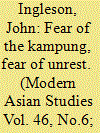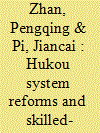| Srl | Item |
| 1 |
ID:
115289


|
|
|
|
|
| Publication |
2012.
|
| Summary/Abstract |
This paper discusses the responses of The Netherlands Indies colonial government to the rise in urban unemployment in Java brought about by the 1930s Depression. At least one in six of the large European/Eurasian population in the colony, and an even larger proportion of urban Indonesian workers, became unemployed as a result of the Depression. The colonial government and the European community were greatly concerned that the growth of unemployment among Europeans would lead to destitution for many, ultimately forcing them into the native kampung1. They were also concerned about what they saw as the moral decay of local-born European/Eurasian youth who were unemployed in unprecedented numbers. Furthermore, the European community feared that the growth in unemployment among western-educated Indonesians in the towns and cities in Java would create a fertile recruitment ground for nationalist political parties leading to urban unrest. Fear of the kampung for destitute Europeans, and fear of urban unrest from unemployed western-educated Indonesians, shaped the colonial government's responses to urban unemployment. The impact of the Depression on both Indonesian and European unemployed in the towns and cities in Java triggered lengthy debates on the role of the state in the provision of social security.
|
|
|
|
|
|
|
|
|
|
|
|
|
|
|
|
| 2 |
ID:
149763


|
|
|
|
|
| Summary/Abstract |
In China, rural migrant workers usually cannot get fair treatment due to the hukou system. This paper investigates how hukou system reforms affect the skilled-unskilled wage inequality through the general equilibrium approach. In the basic model, we find that an increase in the strength of hukou system reforms will narrow down the wage inequality if the urban skilled sector is more capital intensive than the urban unskilled sector. In addition, we separately extend the basic model by introducing the endogenous minimum wage and an informal sector, and find that in these two extended cases the main results of the basic model will conditionally or unconditionally hold. When we consider some empirical evidences in China, our models predict that an increase in the strength of hukou system reforms will reduce the wage inequality.
|
|
|
|
|
|
|
|
|
|
|
|
|
|
|
|